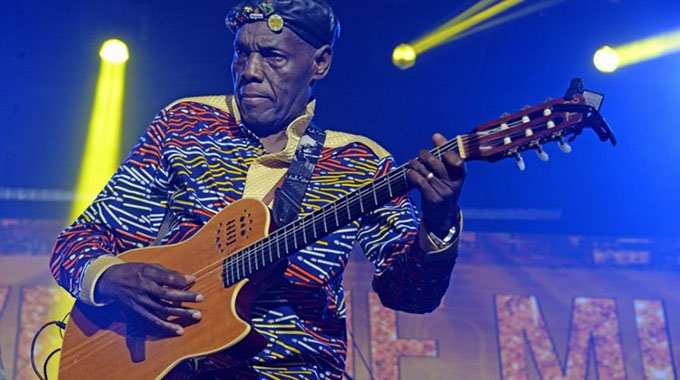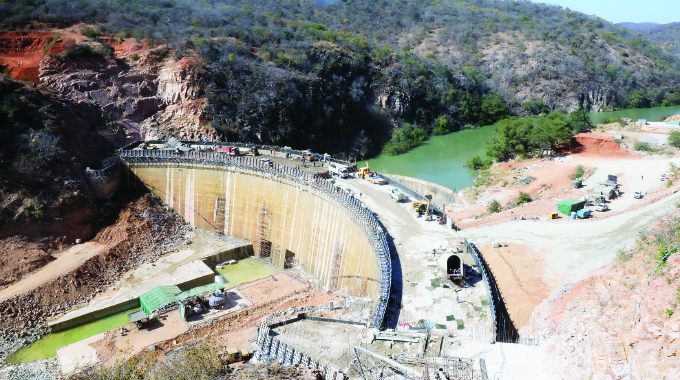‘Man of the cough’ Tuku remembered

Blessings Chidakwa-Arts Reporter
During the height of Covid-19 pandemic that wrecked havoc worldwide, when one coughs, people would look at you with a talking eye.
That was a different case during the days of the late national hero Dr Oliver Mtukudzi, the trademark cough, as he cleared his throat always completed his identity.
The music icon was well known for his compact compositions, characterised by a shifting tapestry of plunking guitars, hoarse lead vocals intermittently spiced with sharp pricking backing vocals and a cross rhythm of the African drum.
Yesterday marked exactly four years since the demise of the country’s finest musician, January 23, 2019 to be specific the globe lost a musical icon succumbing to a long battle with diabetes at Avenues Clinic in Harare.
An internationally acclaimed artiste par-excellence becoming the first musician on Zimbabwe soil to be accorded a national hero status, the great honour befitting only those that served the nation diligently.
His body is resting in his rural home of Madziva, Bindura.
Continue to rest easy Samanyanga as you were affectionately known by your legions of fans globally.
Yours is a legacy of a true son of the soil who never traded his mic for anything except serving the nation sincerely doing what you knew best, entertaining revellers.
You may have departed from mother earth when people still needed you the most but what is left, your music, is still very much alive.
The 66 albums which are at par with the 66 years you lived on earth will continue to stand the test of time.
Whenever Tuku performed the venues were always packed to brim and like always he would do justice give fans value for money leaving them begging for more.
Apart from the fascinating performance on stage everything he touched would turn into gold. Talk of his collaboration with Zimdancehall artiste, Winky D on the track “Panorwadza moyo” his voice dignified the song, gave it meaning and value.
In the opening verse, Winky D starts the line as “Ndanzwa mhere kurira” and when Tuku comes in with an authoritative voice saying “mhere kurira” listeners actually feel a touch of magic. While the song progresses, no doubt many can agree that Samanyanga’s touch of class will be clear.
As soft spoken as he was his beats would always do justice calming one’s thought.
Songs like “Neria” would take one down memory lane to think of injustice that was being faced by women.
But in the song Samanyanga comforts the lady to never lose heart as the Almighty is with her during the times of tribulation.
His music was full of teachings on all aspects of life with tracks as “Tozeza baba” and “Tsika dzedu” attesting to that fact.
On the track “Tsika dzedu” he manifested as an elderly figure questioning what has gone wrong with people as they seem to be abandoning their customs and traditions.
“Ngano dzedu dziye dzakaendepi? Tsika dzedu dziye dzakaendepiko? Kudya kwedu kuye kwakaendepi Nyevhe yedu iye yakaendepiko? . . . ”
On the part, “nyeve yedu yakaendepi” Tuku is asking about the missing healthy balanced diet which was slowly being replaced with junky foods.
Tuku even had the audacity and tenacity to talk to God directly about misfortunes that were happening including in the song “Pindurai Mambo.”
“Oh, Mwari mudenga, baba, mukoma (x3) Kana chiri chitadzo chavo kwamuri, Mambo. Chido chenyu here ichi? Pindurai Mambo Dai mavaregerera Mwari ndateterera Chido chenyu here ichi? Pindurai Mambo.”
“Vanorara musango vachichema kwazvo Vamwe vanotsanya vachigunun’una Zviri kwamuri Mambo, kuda kwenyu itai Chido chenyu here ichi? Pindurai Mambo.”
Surely a stream can never rise about its source, although channels maybe deepened and widened.
Such is the case of Tuku whose shoes that has no one to fill?
Even Sam Mataure who worked with him for more than a decade as a manager and administrator told our sister paper The Sunday Mail that the void left by Tuku will never be filled.
“When Tuku died, I never entertained thoughts of finding a replacement. He is simply irreplaceable. Even if his son Sam was alive, he was not going to come anywhere near, in terms of talent,” Mataure said.
The late music icon, Tuku hailed from Mbire, deep down in the Zambezi Valley, some 200km north of Harare.
Despite growing up in the ghetto suburb of Highfield, Tuku hailed from Mukonowenzou village at Chitsungo in Mbire.
Mbire is also affectionately referred to by locals as Dande, for hosting the biggest stretch of Dande River.
The place apparently influenced Mtukudzi’s song Dzoka Uyamwe, commonly referred to his legion of fans as Ndafunga Dande.









Comments